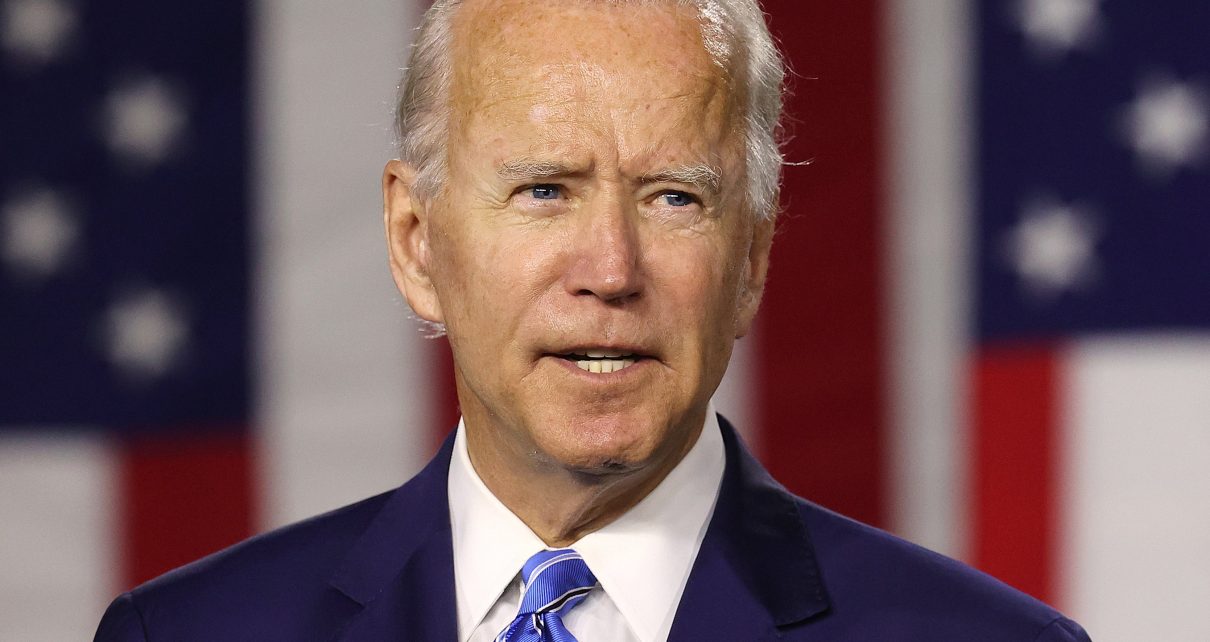Former Vice President Joe Biden had already assembled a task force of activists and liberal officials to rewrite his climate plan. But there was a problem: Organized labor hadn’t been invited to the weekly Zoom calls.
Biden had tailored his presidential campaign to accommodate the unions that build and maintain natural gas projects, and unions had returned the favor by boosting Biden’s candidacy during his lowest points in the Democratic primary.
They were unhappy about being shut out from drafting his new energy plan.
So the campaign quietly added a member to its climate task force: Democratic Rep. Conor Lamb, whose gas-heavy Pennsylvania district had voted for Donald Trump in 2016. Lamb had already distinguished himself as a defender of Biden’s support for hydraulic fracturing.
“They came to me, and I think it was mostly about my connection with the labor unions and the fact that western Pennsylvania is, you know — this is a major issue there,” Lamb told E&E News.
Since he became the presumptive Democratic nominee, Biden has rolled out more than 100 pages of new policy under the auspices of publicly announced task forces, an unusual level of transparency for a presidential campaign. But his team has been tight-lipped about Biden’s sprawling circle of formal and informal advisers.
Both the left and right have hammered Biden when some of his advisers have been revealed — treating them as a proxy for future staffing and policy decisions.
That’s been especially true for climate issues, on which Biden is being pulled in several directions at once. He faces the demands of progressives who view him with suspicion; the economic concerns of his moderate and blue-collar base; and a Republican campaign apparatus attacking his plans as job killers, sometimes relying on falsehoods to do so.
That ruthless dynamic drove former Treasury Secretary Larry Summers yesterday to disavow any interest in returning to the federal government. News earlier this year that he had been advising Biden led progressives to organize a weekslong campaign against him, in part due to his centrist climate record.
Biden is navigating those crosscurrents with advice from several former Obama administration officials — including some who have cultivated ties to industry — as well as former rivals, activists and union leaders. Some of them, like environmental justice advocates, say it’s the first presidential campaign to take them seriously.
Cecilia Martinez, co-founder of the Center for Earth, Energy and Democracy, said environmental justice leaders have gotten a level of access to the presumptive Democratic nominee’s policy aides that’s almost unheard of.
“It’s the first time in [the environmental justice] world that the candidate has reached out so early,” she said.
Rub it in your face
Biden’s first climate plan outlined a range of environmental justice problems, but it included few specific policies to address the disproportionate effects that climate change will have on people of color.
Biden’s new plan, released last month, calls for creating a White House council on environmental justice, revamping EPA’s civil rights office and directing more pollution monitoring resources to frontline communities — all priorities of environmental justice advocates.
The campaign also elevated Martinez and another environmental justice leader, Harold Mitchell Jr., to Biden’s Climate Engagement Advisory Council. The group focuses on mobilizing voters, but it also includes figures who have played a significant role in fine-tuning Biden’s climate posture, like Lonnie Stephenson, president of the International Brotherhood of Electrical Workers, who had been one of the loudest voices in the party opposing the Green New Deal.
Since the early days of the campaign, Stephenson has pushed Biden to support nuclear power and natural gas, two big sources of union jobs, as well as carbon capture and sequestration, a developing technology that may give a second life to fossil fuel-generated power.
So even as some activists have called Biden’s plan a Green New Deal in all but name, Stephenson said it has key differences that stem from unions being at the table.
“I’ve got to tell you, I’ve gotten pushback from some of my members that come from that coal industry. But this is different than what it was four years ago, because we are having some input,” he said.
“They’re not just hearing the Democratic Party say they’re going after coal. They’ve softened the talk. [Workers] all know in reality where it’s going to go, but it’s not like a rub-it-in-your-face-type conversation.”
Jamal Raad, co-founder of the climate group Evergreen Action, said the campaign’s new plans speak to Biden’s talent as a coalition builder.
“One of Biden’s great strengths is listening,” said Raad, who worked on Washington Gov. Jay Inslee’s (D) climate-oriented presidential campaign.
“It was a pretty difficult thing to do, to make labor advocates, environmental justice leaders and climate advocates happy. And the Biden team pretty nimbly and creatively found a way to do that,” he added.
Echoes of Obama
Stef Feldman, Biden’s policy director, has played a major role in shaping his climate plans. She worked on energy and environment issues for Biden when he was vice president. After the Obama administration, she stayed in his orbit by working as the policy director of the University of Delaware’s Biden Institute.
She wrote her senior thesis at Duke University on Appalachian economic development, tracing the influence of local agencies as well as the feelings of abandonment that rural officials felt about the concentration of federal and state spending in cities.
Another person involved is Ali Zaidi, a former Obama White House official who held several climate-related roles, including the Office of Management and Budget’s associate director for natural resources, energy and science. He also worked in the Energy Department and on the Domestic Policy Council. Since the Obama administration ended, he’s taught at Stanford University and held senior climate roles under New York Gov. Andrew Cuomo (D).
Zaidi also advised the presidential campaign of Beto O’Rourke (D), who was among the first 2020 candidates to release a climate plan. O’Rourke, a former congressman from Texas, proposed spending $5 trillion over a decade — a rate Biden has roughly adopted in his new plan by pledging to spend $2 trillion in his first term.
Also in the mix is David Kieve, who has been tasked with outreach to green groups and environmental justice leaders. A founder of the political consulting firm Hilltop Public Solutions, he’s worked with several campaigns, including Bill de Blasio’s successful 2013 race to be mayor of New York.
Last week, Kieve and Zaidi gave an hourlong presentation on Biden’s energy plans to Clean Energy for Biden, a group that has raised more than a half-million dollars for the campaign, according to a Facebook post by the Democratic Party of Lorain County, Ohio. An official with the county party declined to comment on the event.
Cristóbal Alex, a senior campaign adviser who served on Biden’s immigration task force, has been involved in climate policy, too. He was among the staffers who met with climate activists after Biden clinched the nomination. In the past, he was a board member for the League of Conservation Voters.
Symone Sanders, another senior adviser, has been handling outreach to youth and progressive groups — a portfolio that has come to include climate.
And Erika Dinkel-Smith, Biden’s director of labor engagement, has also taken a significant role in climate policy.
Biden campaign staffers guided the work of the climate task force Biden established with former supporters of Vermont Sen. Bernie Sanders’ presidential bid.
That task force included former Secretary of State John Kerry; Reps. Alexandria Ocasio-Cortez (D-N.Y.), Donald McEachin (D-Va.) and Kathy Castor (D-Fla.); former EPA Administrator Gina McCarthy; longtime Biden adviser Kerry Duggan; Sunrise Movement co-founder Varshini Prakash; environmental justice advocate Catherine Flowers; and, eventually, Lamb.
Tensions bubble
Biden has amassed a sprawling personal network during his nearly five decades in Washington. That can blur the lines between his formal advisers and his informal contacts.
For instance, Biden’s campaign weathered criticism last year after Heather Zichal, climate czar in the Obama White House, who later sat on the board of a natural gas company, described Biden as seeking a “middle ground” on climate.
Reuters quoted Zichal as part of a group advising Biden on climate change, but the Biden team has said she wasn’t part of the campaign.
Biden’s campaign has also drawn advice from an informal network of Obama Energy Department alumni, according to a source familiar with the campaign’s outreach.
Former Energy Secretary Ernest Moniz has been involved with the Biden campaign, according to another source. Moniz helped craft the Paris climate agreement. He also sits on the board of Southern Co., a utility that generates 77% of its energy from fossil fuels; by comparison, the national energy mix is closer to 63% fossil fuels.
Moniz also spearheaded the “Green Real Deal,” a centrist rejoinder to the Green New Deal that he formulated last year with input from unions and unveiled at the U.S. Chamber of Commerce (Energywire, Aug. 1, 2019).
Brian Deese, a former senior adviser to Obama on energy and climate, has also been working with the campaign. Deese is now global head of sustainable investing at BlackRock Inc., the world’s largest investment firm.
Some activists have bristled at the Biden campaign for taking advice from officials who are now affiliated with Wall Street or polluting industries.
Jason Bordoff, a former White House energy adviser who advocated exporting fossil fuels, and former State Department official Amos Hochstein, who has since worked for a natural gas firm, are also in activists’ crosshairs, according to Bloomberg.
But others have seen something different in the variety of people influencing Biden’s climate plan: a broad, durable coalition that’s balancing traditional powers with the rising influence of Black and grassroots organizers.
“By no means is it easy. This has been 200 years in the making,” Martinez said.
Reprinted from Climatewire with permission from E&E News. E&E provides daily coverage of essential energy and environmental news at www.eenews.net.



